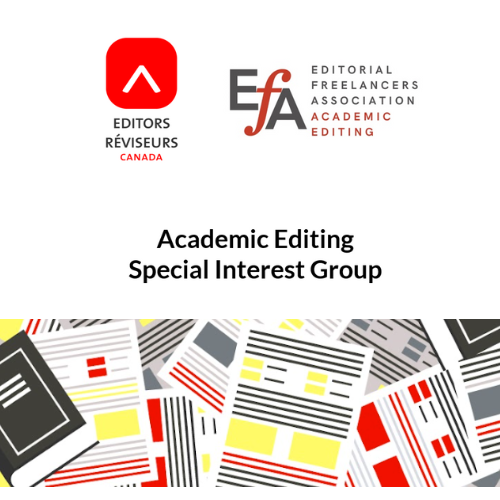As populism and funding priorities threaten the existence of post-secondary and research institutions, academic writing persists. So, too, does academic editing.
In early April, I was part of a group of four panelists who converged at the ACES conference in San Diego, California, to talk about the challenges facing academic editing.
Whether you are an academic editor or an ally, please read on. And definitely consider joining the Academic Editing special interest group (also called the Academic Editing Chapter), a joint collaboration between Editors Canada and the Editorial Freelancers Association (EFA) that connects and supports folks in our line of work!
About the panel
The conference panel (moderated by Mary Hannah Griebel) consisted of Bailey Harrington, Letitia Henville, Akiko Yamagata, and me, Rees Storm. All four of us have been part of the Academic Editing Chapter since its inception. Currently, Bailey, Letitia, and I serve on the leadership team of the chapter.
Our audience was split between people working as academic editors, people working in an area adjacent to academic editing, and people interested in hearing more about academic editing.
A bridge to the public
The panel sparked good conversation. Each of us came to academic editing through the ranks of academia but in different ways. Three panelists have PhDs, and I have a master’s. Two edit predominantly in the humanities and two in STEM.
Yet we’ve all encountered challenges resulting from the changing funding landscape. Now more than ever, there is a need to bridge the gap between the academy and the public. What’s at risk? The public won’t support what it doesn’t understand, and with multitudes of complex problems for humanity to solve, the academic voice is an important one to include. For many, though, academic jargon is a barrier. That is why editing can be key in distilling complex messages into plain language, such as in plain language summaries for scholarly articles. For more information about plain language, check out these previous Editors’ Weekly blog posts.
Many in the room expressed interest in — and passion for — discovering how editors can help translate research, theory and learning into the public sphere and make them accessible to lay audiences.
We also discussed the power of our collective voice. Despite most of us working in isolation from other editors, we are stronger together. We help academic writers craft their messages; is it time for us to be crafting our own message too? How can we, collectively, stake our claim as an indispensable industry? How can we support academia and knowledge acquisition while also helping to bridge the gap to the public, ensuring a clear understanding and appreciation of the work of researchers and academics? And frankly, how do we justify our role and the ROI for academic writers and their institutions who are already having to make increasingly difficult decisions on fund allocation? These are some of the existential questions we face as academic editors.
Learn more
In 2022, Editors Canada and the EFA collaborated to create the Academic Editing Chapter. This special interest group offers support and networking to academic editors. Its launch in September 2022 saw an immediate surge of sign-ups as 400 people joined. Now the roster is over 800.
We invite you to explore how you can be a part of the collective, part of the bridge, by connecting with the Academic Editing Chapter!
___
The Editors’ Weekly is the official blog of Editors Canada. Contact us.
Discover more from The Editors' Weekly
Subscribe to get the latest posts sent to your email.
